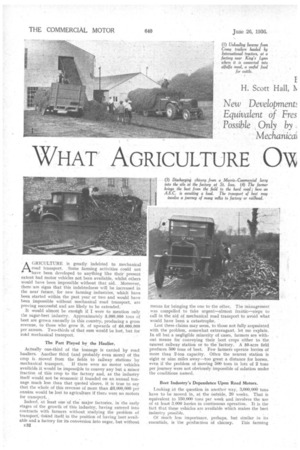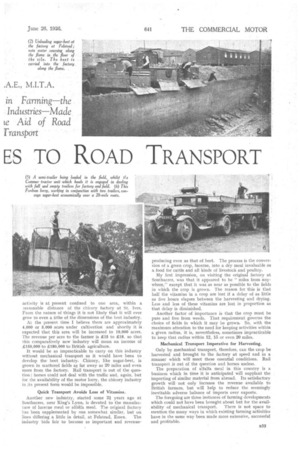WHAT AGRICULTURE Ox
Page 74

Page 75

If you've noticed an error in this article please click here to report it so we can fix it.
ES TO ROAD TRANSPORT
H. Scott Hall, 1‘. ,A E., MITA.
AGRICULTURE is greatly indebted to mechanical road transport. Some farming activities could not have been developed to anything like their present extent had motor vehicles not been available, whilst others would have been impossible without that aid. Moreover, there are signs that this indebtedness will be increased in the near future, for new farming industries, which have been started within the past year or two and would have been impossible without mechanical road transport, are proving successful and are likely to be extended.
It would almost be enough if I were to mention only the sugar-beet industry. Approximately 0,000,000 tons of beet are grown annually in this country, producing a gross revenue, to those who grow it, of upwards of £6,000,000 per annum. Two-thirds of that sum would be lost, but for road mechanical transport.
The Part Played by the Haulier.
Actually one-third of the tonnage. is carried by road hauliers. Another third (and probably even more) of the crop is. Moved from the fields to railway stations by
mechanical transport. If there were no motor vehicles available it would be impossible to convey any but a minor fraction of this crop to the factory and, as the industry itself Would not be economic if founded on an annual tonnage much less than that quoted above, it is true to any that the whole of this revenue of more than £6,000,000 per annum would be lost to agriculture if there were no motors for transport.,
Indeed, at least one of the major factories, in the early stages of the growth of this industry, having entered into contracts with 'farmers without studying the problem of transport-, -found itself in the position of having beet available and a factory for its conversion into sugar, but without
n32 means for bringing the one to the other. The management was compelled to take urgent—almost frantic—steps to call in the aid of mechanical road transport to avoid what would have been a catastrophe.
Lest these claims may seem, to those not fully acquainted with the problem, somewhat extravagant, let me explain. In all but a negligible minority of cases, farmers are without means for conveying their .beet crops either to the nearest railway station or -to the factory. A 50-acre field produces 500 tons of beet. Few farmers operate lorries of more than 2-ton capacity. Often the nearest station is eight or nine miles away—too great a distance for horses, even if the problem of moving 500 tons in lots of 2 tons per journey were not obviously impossible of solution under the conditions named.
Beet Industry's Dependence Upon Road Motors.
Looking at the question in another way, 3,000,000 tons have to he moved in, at the outside, 20 weeks. That is equivalent to 150,000 tons per week and involves the use of at least 3,000 lorries in continuous operation. It is the fact that these vehicles are available which makes the beet industry possible.
Of much less importance, perhaps, but similar in its essentials, is the production of chicory. This farming
activity is at present confined to one area, within a reasonable distance of the chicory factory at St. Ives, From the nature of things it is not likely that it will ever grow to even a.tithe of the dimensions of the beet industry.
At the present time I believe there are approximately 4,000 or 5,000 acres under cultivation and shortly it is expected that this area will be increased to 10,000 acres. The revenue per acre to the farmer is 215 to 218, so that this comparatively new industry will mean an income of 2150,000 to 2180,000 to 13ritish agriculture.
It would be as impracticable to carry on this industry without mechanical transport as it would have • been to develop the beet industry. .Chicory, like sugar-beet, is grown in scattered fields as far away as 20 miles and even more from the factory. 11-ail transport is out of the question: horses could not deal with the traffic and, again, but for the availability of the motor lorry, the chicory industry in its present form would be impossible.
Quick Transport Avoids Loss of Vitamins.
Another new industry, started some 2i years ago at Southacres, near King's Lynn, is devoted to the manufacture of lucerne meal or. alfaAfa, Meal, The original factory has been supplemented by one somewhat similar, but on lines differing a little in detail, at Felstead, Essex. The industry bids fair to become as important and revenue producing even as that of beet. The process is the conversion of a green crop, lucerne, into a dry meal invaluable as a food for cattle and all kinds of livestock and poultry.
My first impression, on visiting the original factory at Southacres, was that it appeared to be " miles from anywhere," except that it was as near as possible to the fields in which the crop is grown. The reason for this is that half the vitamins in a crop are lost if a delay of as little as five hours elapses between the harvesting and drying. Less and less of these vitamins are lost in proportion as that delay is diminished.
Another factor of importance is that the crop must be pure and free from weeds. That requirement governs the choice of fields in which it may be grown. So, with the maximum attention to the need for keeping activities within a given radius, it is, nevertheless, sometimes impracticable to keep that radius within 12, 15 or even 20 miles.
Mechanical Transport Imperative for Harvesting.
Only by mechanical transport, therefore, can the crop be harvested and brought to the factory at speed and in a manner which will meet these essential conditions. Rail transport is out of the question and horses useless.
The preparation of alfalfa meal in this country is a business which in time it is anticipated will supplant the importing of similar material from abroad. Its satisfactory growth will not only increase the revenue available to British farmers, but will help to reduce the seemingly inevitable adverse balance of imports over exports.
The foregoing are three instances of farming developments which could not have been brought about tint for the avail ability of mechanical transport. There is not space to mention the many ways in which existing farming activities have in the same way been made more extensive, successful and profitable.












































































































































